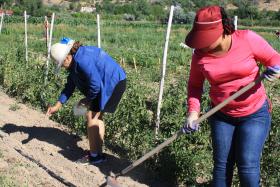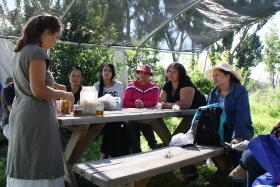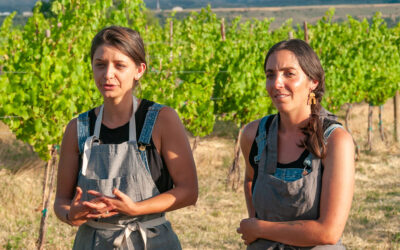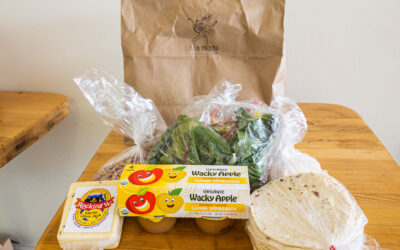
Hortenica Galvez learns about gardening and practices her English through a Colorado farm program. Credit Laura Palmisano / KVNF
A program in Colorado’s Delta County is helping immigrant women learn English, but they’re not just sitting in a classroom studying grammar.
These women come from countries as close as Mexico and as far away as Myanmar. And they’re learning English on a farm where they also pick up tips on healthy eating and gardening on the Western Slope.
A Trip to the Farm:
It’s a warm summer day at Thistle Whistle Farm, a 16-acre spread on the outskirts of Hotchkiss. But despite the heat, eight women are here pulling weeds and planting cabbage seeds.
They’ve traveled 45 minutes from Delta.
Participant Yadira Rivera even brought her three kids along. That’s a big help because it gives them something to do while school’s out.
“My kids enjoy coming to the farm and they like it because they learn about plants and how to grow some vegetables,” she said.
Since she’s been coming here, Rivera and her family have planted their own garden back home.
“We grow chili, tomatoes, cilantro and basil,” she said.
But these women are not just learning what grows and what doesn’t on the Western Slope. They’re also learning how to eat well.

Two of the program’s participants plant cabbage. Credit Laura Palmisano / KVNF
Chrys Bailey is their teacher.
“A lot of what has brought them to the program is that they are noticing that their families and themselves are beginning to suffer from health issues that they had not suffered from before and they are making the connection that some of their food choices are not serving them,” she said.
Bailey said most of the women involved are learning English. They found out about the program through their ESL class.
“This is also an opportunity for them to both learn how to speak and hear English and write because we write down a lot of the things we do here,” she said. “So they get a lot of support to practice their English skills here.”
Veronica Holguin moved to Colorado from Chihuahua, Mexico. She has diabetes and high blood pressure, but she wants to be healthier.
“I’m learning about the plants and the food,” Holguin said. “I [now] make different food, more healthy.”
Mark Waltermire owns Thistle Whistle Farm. He said he hopes the women get as much out of the exchange as he does.
“They’ve suggested or requested I grow a lot of vegetables and herbs I haven’t heard or tried before and I’ve been introduced to all sorts of fun, new varieties and fun new vegetables that I would otherwise not have been exposed to.” Waltermire said. “So it has changed my diet too. I eat all sorts of things that I previously never knew about.”
Nutrition teacher Chrys Bailey said the four-year-old program must be doing something right. Each year, the women keep coming back.
“They have learned how to first of all grow food and feel that they can grow food no matter what their circumstances are,” Bailey said.

Women in the program learn about different use for herbs. Credit Laura Palmisano / KVNF
She said if the women only have a few pots they can grow food for their families.
“Then they are becoming ever more emboldened at this point to take foods that they are unfamiliar with and begin to experiment and make new foods for their families and change what’s going on in their family dynamic with regard to healthy foods,” Bailey said.
The [Delta Family Center] runs the program.
Its main source of funding comes from [grants] through the Colorado Health Foundation [and the Kampe Foundation].
However that money runs out this year, and unless another source of funds can be found, the program may end.





